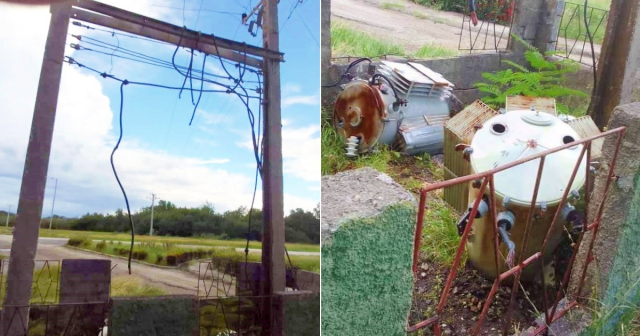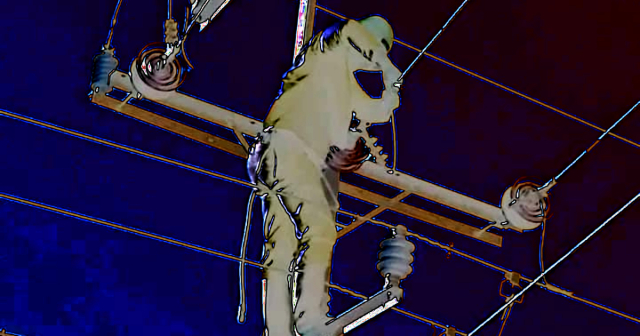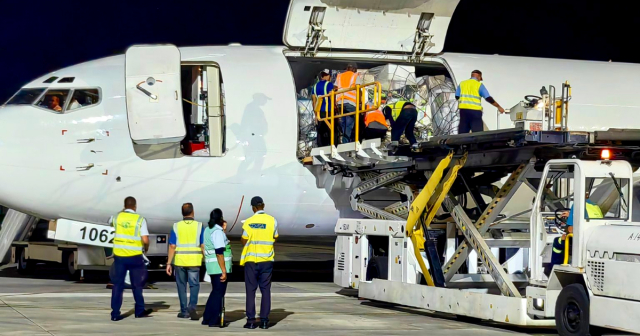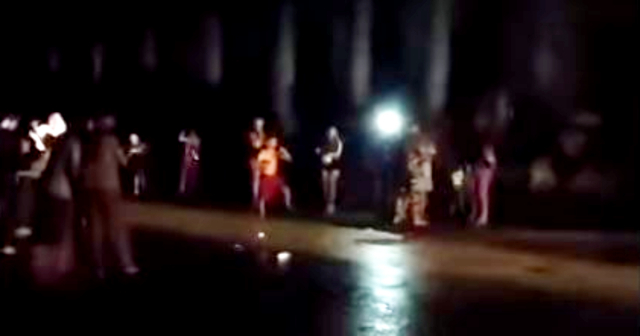Pinar del Río is in a critical situation after experiencing more than 120 continuous hours without electricity, a blackout that began on Tuesday, November 5, and has pushed the population to the brink of endurance.
According to reports from José Rolando Casares Soto, an independent journalist and opposition figure, the city is practically shrouded in darkness, except for a few specific areas such as the facilities of the Telecommunications Company of Cuba S.A. (ETECSA) and the well-known Reparto Los Militares, which continue to have electricity while the rest of the residents in Pinar del Río cope with the darkness and its consequences.
This was reported by the activist in a video shared on the social media of the non-governmental organization Cubalex, in which he showed a panoramic view of the city completely in darkness, except for two areas: the aforementioned state-owned company and the neighborhood where members of the Revolutionary Armed Forces reside in Pinar del Río.
"In addition to the lack of electricity, the journalist reports a noticeable police presence on the streets of Pinar del Río, which intensifies the tension in the city," the NGO explained in its post, denouncing that "the energy crisis has exacerbated the serious humanitarian situation" in the country.
The area known as Reparto Los Militares—its designation in the announcements of scheduled blackouts by the Electric Company of Pinar del Río—is located, according to information from Casares Soto, near or part of the Reparto 10 de Octubre.

Beyond the aforementioned neighborhood, the cityscape revealed lights on the ETECSA antenna, a police station, and fewer than a dozen illuminated residences thanks to private generators.
"Pinar del Río completely in the dark," summarized Casares Soto in his post, alerting that this situation dates back to the total collapse of the national electroenergetic system (SEN) that occurred on October 18, since which time the westernmost province of Cuba has been experiencing a massive blackout.
Energy crisis in Cuba and its impact on the province of Pinar del Río
This prolonged power outage is not an isolated incident but part of an energy crisis that has been affecting Cuba for months, which has worsened in the western provinces such as Pinar del Río.
According to previous reports, at least four provinces, including Pinar del Río, have experienced recurring disconnections from the national electrical system. A lack of maintenance in the infrastructure, fuel shortages, and an outdated electrical grid have contributed to the collapse of service, forcing thousands of families to live in conditions that verge on a humanitarian emergency.
The situation is particularly concerning in Pinar del Río, where the lack of electricity has severely affected access to basic services such as drinking water and food preservation.
The prolonged absence of electricity hinders the operation of water pumps and refrigeration systems, which in turn affects public health and food security for the population. As the hours pass without signs of a near solution, uncertainty and frustration grow among the residents.
Citizens have noted that the unequal distribution of electricity supply, where only specific areas have power, heightens the perception of inequality and discrimination.
While the distribution of military personnel and other strategic points continue to have electricity, the most vulnerable communities remain in darkness, lacking means to cope with the heat and absence of basic resources. This contrast has sparked significant social discontent and led some to question the priorities of local and national authorities.
The police presence, reported by Casares Soto, adds another layer of tension to an already delicate situation. Surveillance in the streets and the suppression of any protest attempts are common practices in crisis situations in Cuba, and Pinar del Río is no exception.
In previous instances, protests over prolonged blackouts in various parts of the country have led to arrests and repressive measures. Recently, the General Prosecutor's Office of the Cuban regime confirmed arrests related to demonstrations over the lack of electricity.
The issue of power outages is not new in Cuba, but it has reached unprecedented levels in recent months. The Electric Union of Cuba has acknowledged that the disruptions in service are due to both a lack of fuel and failures in the electrical infrastructure.
However, the solutions proposed so far have been seen as insufficient to meet the needs of the population. In the case of Pinar del Río, the lack of investment and modernization of the power plants has made the situation particularly difficult, limiting options for the residents.
The energy crisis in Cuba has tested the patience of its people. In Pinar del Río, residents face daily uncertainty, striving to maintain a sense of normalcy while the electric supply remains intermittent and limited.
Extended blackouts affect not only households but also hospitals, educational institutions, and small businesses, halting activities and plunging the region into a profound economic and social crisis.
Specialists have emphasized the urgency of implementing structural changes in Cuba's electrical system to prevent situations like this from happening again. However, long-term solutions remain a monumental challenge in a country that heavily relies on outdated infrastructure and limited energy resources.
The population of Pinar del Río, like in other regions of Cuba, faces an uncertain future as the energy crisis persists. In the short term, the prospect of improvement seems distant, and communities continue to struggle with the hope that the situation will change before the lack of resources and social fatigue lead to an even deeper crisis.
What do you think?
COMMENTFiled under:






